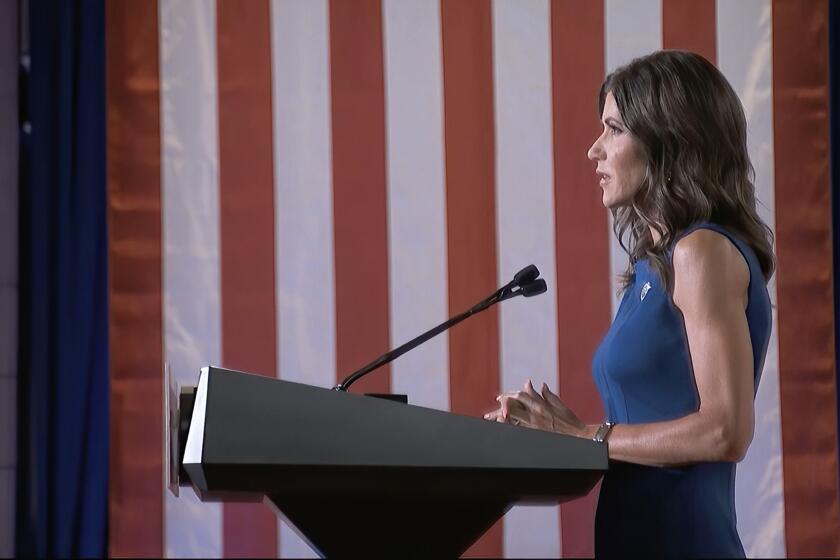Unprecedented Battle in Press : Letters to Soviet Editor: Perestroika, Pro and Con
An unprecedented debate has surfaced in the Soviet press in recent days over the direction of the economic reform program of Soviet leader Mikhail S. Gorbachev.
The rancorous exchange could help shape the future of Gorbachev’s perestroika , or restructuring of Soviet society, and may eventually affect the political fate of Gorbachev himself.
Although criticism of certain aspects of Soviet society has been encouraged in keeping with the glasnost , or openness, policy adopted earlier by Gorbachev, the debate in the press calls into question the reform program itself.
The criticism of perestroika is believed to represent the views of a conservative faction in the Soviet leadership, a faction apparently growing alarmed at the pace and scope of the changes proposed by Gorbachev. The Kremlin leader has proposed a broad modernization of the Soviet economy, cutting back the power of central planners and relying more on local decision-making in order to increase food supplies and consumer goods and improve, among other things, the quality of health care.
According to Western analysts, the extraordinary debate reflects to a great extent the political maneuvering taking place in advance of the Communist Party conference scheduled to begin June 28.
No agenda has been announced, but it is widely believed that the conference will become a litmus test for perestroika. Significant opposition could arise.
The first volley in the press debate was fired March 13 when the daily Soviet Russia published a full-page letter headed, “I Cannot Give Up My Principles.”
Purportedly written by Nina Andreyeva, a lecturer at Leningrad’s Technological Institute, the letter says that “much has appeared of late with which I cannot agree,” and goes on to become virtually a manifesto of the conservative opposition to Gorbachev.
Because of the sensitive nature of the letter’s subject, diplomats here are convinced that the newspaper received clearance at the highest level--meaning from someone in the ruling Politburo--before printing it.
A popular theory, although it has not been officially confirmed, is that Andreyeva wrote a brief letter on the subject to Yegor K. Ligachev, the Politburo ideologist, who then ordered the newspaper, an increasingly orthodox publication, to print it, and that it was somewhat embellished by the newspaper’s editor, Valentin V. Chikin.
Ligachev is the second-ranking member of the hierarchy and is known to be the leading conservative voice in the Kremlin.
Achievements Cited
The letter calls for maintaining a balanced view of the Soviet past. It says in essence that mistakes were committed under dictator Josef Stalin but that there were significant achievements as well.
“The formula of personality cult artificially embraces industrialization, collectivization and the cultural revolution, which put our country among the leading world powers,” the letter s1635349294doubts.”
Gorbachev has personally condemned Stalin for “enormous and unforgivable crimes” committed in the 1930s, and recently, Soviet publications for the first time have acknowledged the vast scale of the Stalinist repression, which has long been a matter of record in the West.
The Andreyeva letter portrays supporters of perestroika as either “neo-liberals” who would substitute “the democratic charms of capitalism” for socialism, or “traditionalists” who seek a return to the old Russia of the czars.
Fears for Reforms
Publication of the Andreyeva letter caused a sensation in Moscow’s intellectual circles, where it was feared that the Gorbachev reforms were about to be emasculated or undone.
The authoritative reply came two weeks later on April 5, when Pravda, the official newspaper of the Communist Party, published a response that, in the words of a senior Western diplomat, “put the kibosh” on the conservative position outlined in the Andreyeva letter.
The Pravda article, the diplomat said, was an “authorized expression of Central Committee opinion that perestroika is going forward as well as glasnost. “
Pravda said that people looking at the Stalin record should take into account his undisputable achievements as well as his “crude political blunders,” including arbitrary rule.
The newspaper denounced those who attempt to “whitewash Stalin,” saying they are attempting to preserve for today “the right of arbitrary rule.”
Pravda lashed out at Soviet Russia for publishing the Andreyeva letter, which it said was an attempt “little by little to revise party decisions.” Pravda said that “the Soviet press is not a private shop,” and that editors should be aware of their personal responsibility for what they publish.
The final blow fell a few days later, when Soviet Russia reprinted the Pravda article in full.
Avalanche of Letters
A few letters then appeared in support of the Andreyeva letter, but there was an avalanche of letters attacking it and supporting Pravda.
Although clearly the debate was resolved, temporarily at least, in Gorbachev’s favor, it was also clear that there is substantial opposition to his programs. According to one newspaper, chain letters are being circulated in virtually every Soviet city attacking the Gorbachev reforms.
An indication of the direction the debate may take now appeared Tuesday in a front-page article in Socialist Industry.
Signed by Gavril Popov, a popular economist and philosopher, the article acknowledges that the results of perestroika will not only be scientific breakthroughs and an end to consumer shortages but also bad news in the form of bankruptcies, layoffs and inflation. Does the Soviet Union really need to pay such a price? Popov asks, than replies: The country has no choice.
He suggests that economic reform is doomed to failure unless is is accompanied by political reform as well.
Political Restructuring
“The root of the problem,” it says, “lies in the fact that the dismantling of the deceleration mechanism (a code word for opposition to perestroika) never went beyond the purely economic sphere. We all know that politics takes the front seat, that economic reform simply cannot work without political reform. We cannot attain the most effective order in the economy without a restructuring in politics.”
Western analysts believe that Gorbachev may take up this theme at the party conference; that he will emphasize that, in order to achieve promised economic progress, the party must cleanse its ranks of people unable to keep up with the political times.
In other words, a political shakeup may be in the offing. The analysts think it will be in this area that Gorbachev will encounter the greatest possible resistance.
More to Read
Start your day right
Sign up for Essential California for news, features and recommendations from the L.A. Times and beyond in your inbox six days a week.
You may occasionally receive promotional content from the Los Angeles Times.






